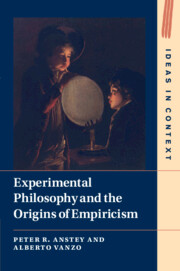Book contents
- Experimental Philosophy and the Origins of Empiricism
- Ideas In Context
- Experimental Philosophy and the Origins of Empiricism
- Copyright page
- Contents
- Figures
- Tables
- Acknowledgements
- A Note on Citations
- Abbreviations
- Introduction
- Part I The Rise of Experimental Philosophy
- Part II The Heyday of Experimental Philosophy
- Part III From Experimental Philosophy to Empiricism
- Chapter 7 Experimental Philosophy in Eighteenth-Century Germany
- Chapter 8 Kant and the Genesis of Empiricism
- Chapter 9 Reinhold, Tennemann, and the Rise of Empiricism
- Conclusion
- Manuscripts Cited
- Newspapers, Broadsheets, and Almanacs
- References
- Index
Chapter 8 - Kant and the Genesis of Empiricism
from Part III - From Experimental Philosophy to Empiricism
Published online by Cambridge University Press: 17 February 2023
- Experimental Philosophy and the Origins of Empiricism
- Ideas In Context
- Experimental Philosophy and the Origins of Empiricism
- Copyright page
- Contents
- Figures
- Tables
- Acknowledgements
- A Note on Citations
- Abbreviations
- Introduction
- Part I The Rise of Experimental Philosophy
- Part II The Heyday of Experimental Philosophy
- Part III From Experimental Philosophy to Empiricism
- Chapter 7 Experimental Philosophy in Eighteenth-Century Germany
- Chapter 8 Kant and the Genesis of Empiricism
- Chapter 9 Reinhold, Tennemann, and the Rise of Empiricism
- Conclusion
- Manuscripts Cited
- Newspapers, Broadsheets, and Almanacs
- References
- Index
Summary
According to a widespread narrative of early modern philosophy, the early modern period was characterised by the development of Descartes’, Spinoza’s, and Leibniz’s rationalism and Locke’s, Berkeley’s, and Hume’s empiricism. The early modern period came to a close once Immanuel Kant, who was neither an empiricist nor a rationalist, combined the insights of both movements in his new Critical philosophy and inaugurated the new eras of German idealism and late modern philosophy. Several scholars have criticised this narrative for overestimating the importance of epistemological issues for early modern philosophers, portraying Kant’s Critical philosophy as a superior alternative to empiricism and rationalism and forcing most early modern thinkers prior to Kant into the empiricist or rationalist camps. Kant’s three Critiques are the first published works that explicitly contrast the terms ‘empiricism’ and ‘rationalism’. This chapter sets out Kant’s contributions to the genesis of the historiographical narrative based on the dichotomy of empiricism/rationalism and argues that Kant is not directly responsible for the biases of that narrative. Kant did not regard the empiricism/rationalism distinction as purely epistemological, did not portray most of his early modern predecessors as empiricists or rationalists, and did not place himself over and above empiricism and rationalism.
- Type
- Chapter
- Information
- Experimental Philosophy and the Origins of Empiricism , pp. 234 - 257Publisher: Cambridge University PressPrint publication year: 2023



